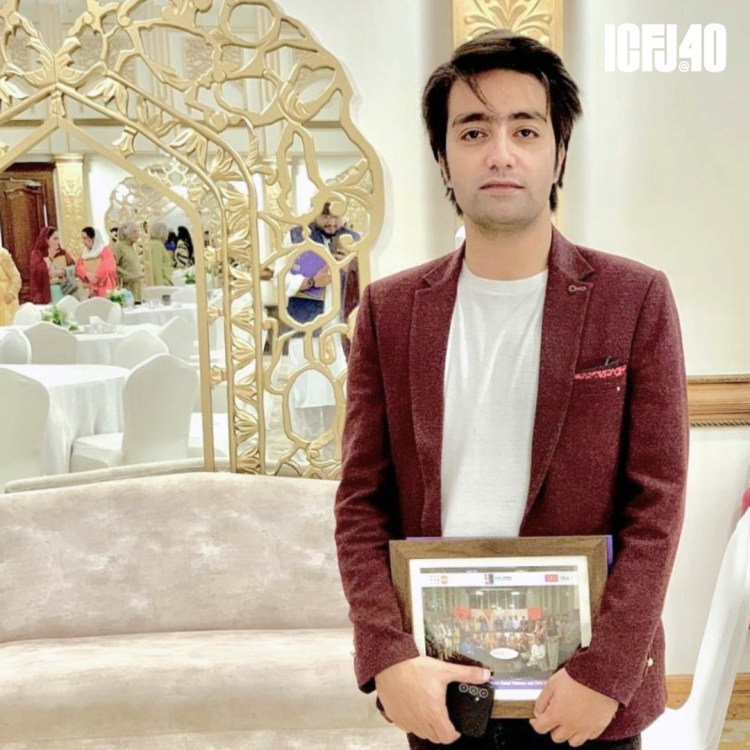Shahzad Naveed is a freelance journalist from Pakistan who works with a variety of organizations. He covers sensitive and challenging topics, including minority rights and human rights.
Through a recent ICFJ workshop in Colombo, he gained practical skills, networked with colleagues in the region and produced an award-winning article. “The workshop had a profound impact,” he says.
This interview has been edited slightly.

How have you been involved with ICFJ over the years?
ICFJ is my dream organization. Since 2020, I've been striving to participate in their fellowship programs, inspired by their work and previous initiatives that can enhance a journalist's career.
Fortunately, I was selected for an ICFJ program called Stemming the Tide of Intolerance: A Network of South Asian Journalists to Promote Religious Freedom in Colombo, Sri Lanka, where I met journalists from diverse backgrounds. We exchanged ideas, worked together and gained remarkable knowledge. Our trainers and mentors were exceptional, providing guidance on challenges and quality journalism in South Asia. After participating in the workshop, my journalistic skills improved significantly.
What was the biggest outcome from participating in the program(s)?
Previously, we had attempted to tackle stories but lacked professional skills. However, after the workshop, I learned how to effectively cover stories and approach sources. Following the program, I conducted an investigative report on honor killings in Swat, Khyber Pakhtunkhwa, which earned me a national award.
I have since produced multiple stories, and I'm heartened to see a positive impact on society and the country.
I have reported on climate change, human rights, minority issues, archaeological sites and terrorism for both national and international media organizations. These topics are often neglected in the region, but I have made it my focus to shed light on the unhighlighted issues and problems. Unfortunately, my coverage has led to threats from various groups and political figures. Nevertheless, I believe in the power of quality journalism and hope that in the future, all journalists will prioritize covering the fundamental issues and problems that matter most.
I will continue my investigative work, and I'm confident that the impact of my stories will resonate globally.
What is something impactful you have worked on since participating in an ICFJ program that you are proud of and would want to highlight? Was your experience with ICFJ helpful in some way for this?
The workshop had a profound impact, enabling us to cover sensitive topics like religious freedom and minority issues with ease.
Previously, journalists hesitated to tackle such stories due to fear of extremist groups and Muslim communities.
Additionally, the training heightened our awareness of social media's challenges, particularly the spread of mis and dis-information, which can harm society and the country. We learned to identify misinformation using various tools and software, and I'm sharing this knowledge with fellow journalists. By applying these tools, we're making a significant positive impact on society and the country.
What kind of difficulties as a journalist have you faced in Pakistan?
Pakistani journalists are currently grappling with a multitude of challenges, including:
-
Job insecurity and precarious employment conditions
-
Security concerns and safety risks, particularly in conflict zones
-
Safety problems, such as harassment and intimidation
-
Downsizing and layoffs, resulting in reduced staff and resources
-
Financial crises affecting both print and electronic media platforms
-
New rules and regulations that potentially restrict press freedom
-
Political interference and pressure to shape narrative and content
These challenges collectively imperil the integrity and independence of Pakistan's media landscape, hindering journalists' ability to report freely and uphold the principles of ethical journalism.
Why did you choose to become a journalist?
I chose journalism to shed light on the overlooked issues and problems in my region, which are often neglected by national media. In particular, climate change is poorly reported, as it's often linked to religion and natural phenomena.
I aim to raise awareness about the neglected problems faced by women, which are frequently ignored due to cultural and patriarchal societal norms.
My hometown, Swat, was ravaged by terrorism from 2007 to 2009, and internationally highlighted the negative aspects of our region. However, I know that Swat boasts stunning tourism potential, archaeological sites, majestic mountains, talented individuals and a rich history.
I'm determined to showcase the true face and correct image of our current situation. I've been working tirelessly to improve the image and highlight the problems of minorities during the militancy period and subsequent military operation. Over a decade later, I'm more determined than ever to create positivity and address the numerous problems faced by minorities through my work, which has immense cultural potential.